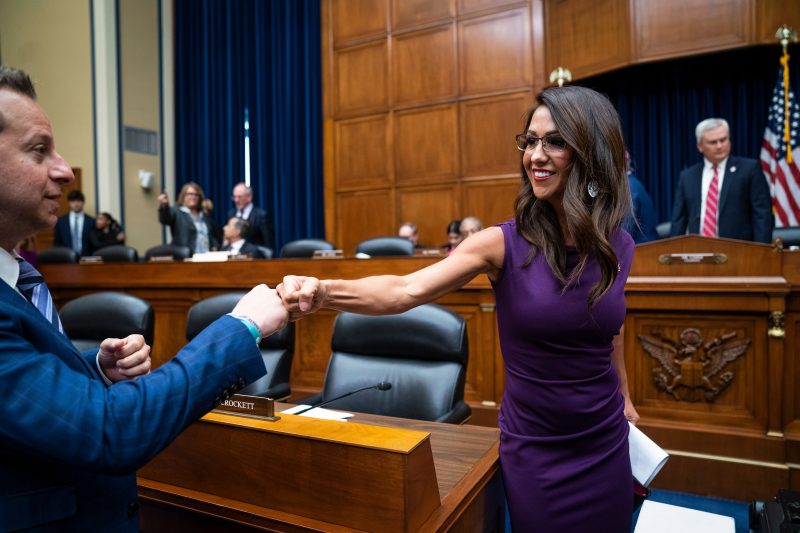President Biden’s trip to Pueblo, Colo., on Wednesday was ostensibly about hailing a key Inflation Reduction Act project and “Bidenomics.”
But it appears to be more about casting a spotlight on that district’s incumbent, Rep. Lauren Boebert (R-Colo.), whom Biden would very much like to tie to the broader Republican Party.
A news release announcing the trip invoked the word “MAGA” four times while referring to Boebert. And Biden has made little secret of wanting to apply that label broadly to the GOP — often adding “extreme” — in ways that will give voters pause.
Perhaps better than anybody in the modern GOP, Boebert embodies an increasingly prevalent and often politically toxic MAGA dynamic. That dynamic is one in which you can quickly build your profile and even wield power in the House by doing controversial and extreme things, but it comes at an evident cost for you and your party’s broader appeal.
Recent polling, when combined with the 2022 election results, demonstrates just how much those who most espouse this approach can pay a price. That was made pretty clear before, but the evidence has only grown in recent weeks.
And that’s particularly when you focus on some of the most famous rabble-rousers in the House GOP: Boebert, Rep. Marjorie Taylor Greene (R-Ga.) and Rep. Matt Gaetz (R-Fla.).
Boebert’s close call in 2022 was already among the most shocking results of that election. She won by a fraction of a percentage point in a district Donald Trump had carried by eight points in 2020. It was the worst underperformance for a House Republican candidate in the country.
Then came the “Beetlejuice” incident in September, in which Boebert was caught on tape vaping and groping a man in a public theater (the video emerged after her office falsely denied the vaping). Shortly thereafter, a national YouGov poll showed Americans disliked her more than 2-to-1. Even Republicans leaned unfavorable.
Not far behind in 2022 under-performances was Greene. The conspiracy-theory-peddling Republican had the third-biggest underperformance. She won by about six fewer points than Trump had.
That Boebert and Greene both ranked in the top three of GOP under-performances is surely no coincidence.
But perhaps the more significant indictment of Greene’s political style came in a recent statewide poll of Georgia this month. The Atlanta Journal-Constitution poll showed a clear 57 percent majority of Georgians had an unfavorable view of Greene, compared to just 25 percent who liked her. Even Republicans were evenly split; independents disliked her 3-to-1.
The picture was similar for Gaetz in a statewide poll in his state this month. A Florida Atlantic University poll last week showed Floridians disapproved of Gaetz 57 percent to 21 percent, in a survey conducted just after he played a starring role in ousting then-House Speaker Kevin McCarthy (R-Calif.).
Nearly half — 46 percent — strongly disapproved of Gaetz, while just 12 percent strongly approved.
Both Gaetz and Greene were also deep underwater in recent national YouGov polls. What the statewide polls suggest is that the people who are more familiar with them appear to be even less amused. (And these are states that are or have until recently been red states.)
Of course, these new polls merely confirm what we saw in the 2022 election. In addition to Greene’s and Boebert’s under-performances, 2020 election-deniers and hard-line abortion rights opponents likewise underperformed on a pretty consistent basis. Running extreme, Trump-aligned candidates might well have cost the GOP the Senate.
But while the drawbacks of Republicans marginalizing themselves were plainly evident at the time, the readily available notoriety involved in going hard to the right and wrecking shop within the party has continued to prove irresistible.
Boebert may yet be willing to risk another potentially arduous race in what should otherwise be a safe district, and Gaetz appears willing to take a gamble on his statewide viability in a run for governor, as appears likely.
The fact that even they are still willing to marginalize themselves says a lot about how attractive this form of provocation is — and how hard it will be for the GOP to shake in the years to come.

